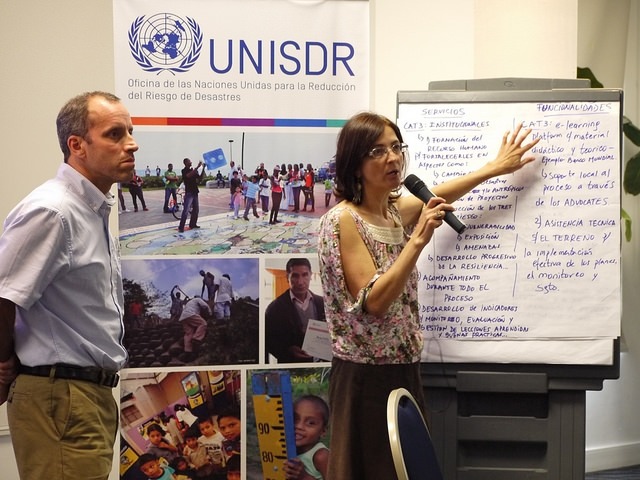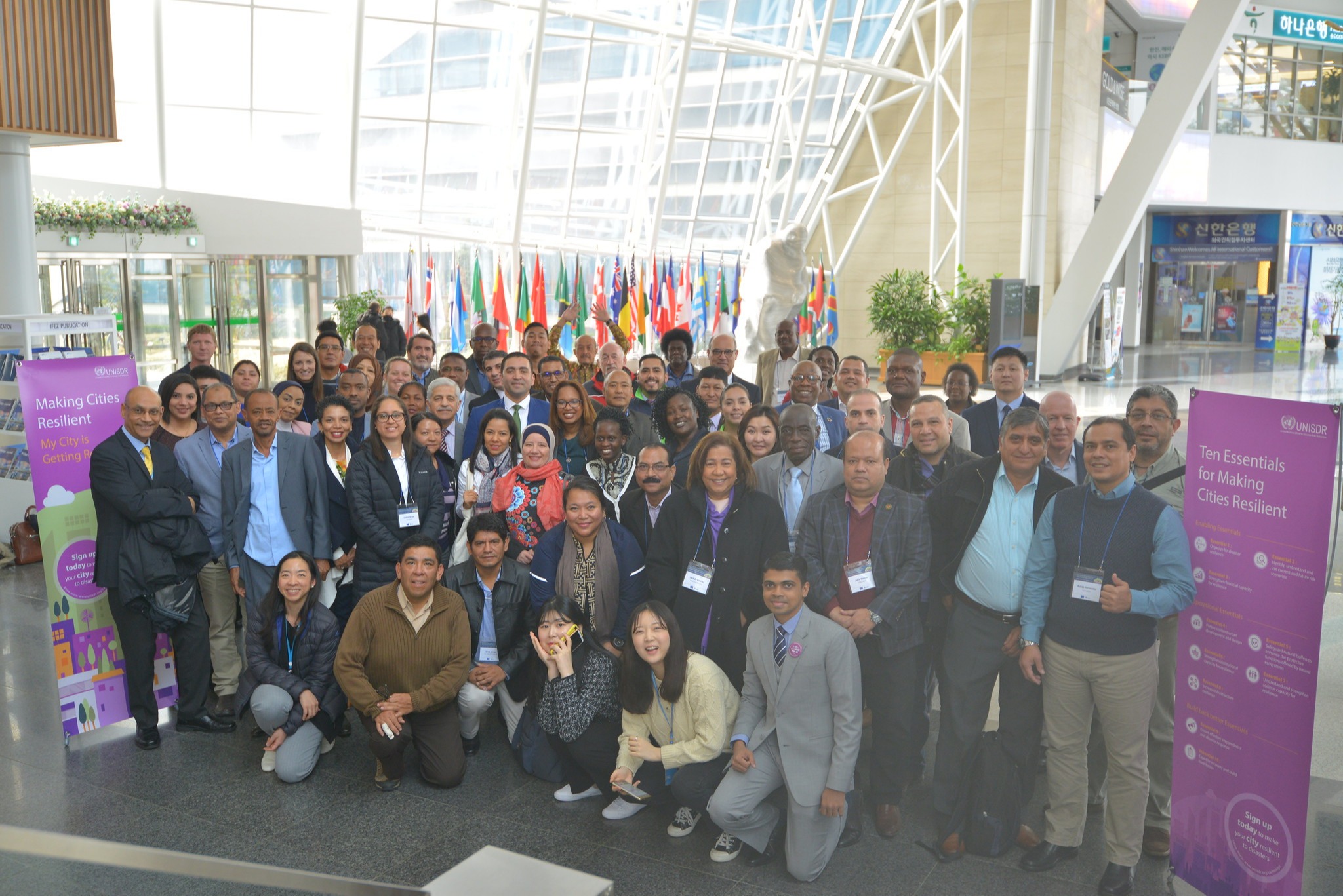
Moving to the Decade of Action with MCR2030
The Making Cities Resilient Campaign has come to its closure and is now succeeded by the new initiative "Making Cities Resilient 2030 (MCR2030)". All...
The Making Cities Resilient Campaign has come to its closure and is now succeeded by the new initiative "Making Cities Resilient 2030 (MCR2030)". All...
Making Cities Resilient 2030 (MCR2030) - initial proposal
The MCR Campaign is due to end in 2020. Cities development partners and a variety of stakeholders unanimously requested that the efforts to support local governments in strengthening disaster and climate resilience must continue. Following a series of consultations held between 2018-2019, it is clear that cities are seeking capacity development guidance in various technical areas ranging from awareness and strategic planning, to effective implementation of the risk-informed urban development plans. This includes, for example, the capacity to finance for resilience; engagement of multi-sectoral and multi-stakeholder groups such as communities, vulnerable population, private sector; the use of nature-based solutions for resilience; the reduction of climate risks through appropriate actions, and others. These inputs have informed the design of the successor of the MCR Campaign – known as the Making Cities Resilient 2030 (MCR2030). Click to see more details.
The MCR Campaign is due to end in 2020. Cities development partners and a variety of stakeholders unanimously requested that the efforts to support local governments in strengthening disaster and climate resilience must continue. Following a series of consultations held between 2018-2019, it is clear that cities are seeking capacity development guidance in various technical areas ranging from awareness and strategic planning, to effective implementation of the risk-informed urban development plans. This includes, for example, the capacity to finance for resilience; engagement of multi-sectoral and multi-stakeholder groups such as communities, vulnerable population, private sector; the use of nature-based solutions for resilience; the reduction of climate risks through appropriate actions, and others. These inputs have informed the design of the successor of the MCR Campaign – known as the Making Cities Resilient 2030 (MCR2030). Click to see more details.
Launch of the Making Cities Resilient 2030 (MCR2030)
Building upon the experience of the Making Cities Resilient Campaign, the Making Cities Resilient 2030 (MCR2030) is a unique cross-stakeholder initiative for improving local resilience through advocacy, sharing knowledge and experiences, establishing mutually reinforcing city-to-city learning networks, injecting technical expertise, connecting multiple layers of government and building partnerships....
Building upon the experience of the Making Cities Resilient Campaign, the Making Cities Resilient 2030 (MCR2030) is a unique cross-stakeholder initiative for improving local resilience through advocacy, sharing knowledge and experiences, establishing mutually reinforcing city-to-city learning networks, injecting technical expertise, connecting multiple layers of government and building partnerships....
The TEN Essentials for Making Cities Resilient
An operational framework of Sendai Framework at local level.
The TEN Essentials for Making Cities Resilient
The TEN Essentials for Making Cities Resilient
Essential One: Organise for Disaster Resilience
Put in place organization and coordination to understand and reduce disaster risk, based on participation of citizen groups and civil society. Build local alliances. Ensure that all departments understand their role to disaster risk reduction and preparedness.
Put in place organization and coordination to understand and reduce disaster risk, based on participation of citizen groups and civil society. Build local alliances. Ensure that all departments understand their role to disaster risk reduction and preparedness.
Essential Two: Identify, Understand and Use Current and Future Risk Scenarios
Assign a budget for disaster risk reduction and provide incentives for homeowners, low-income families, communities, businesses and public sector to invest in reducing the risks they face.
Assign a budget for disaster risk reduction and provide incentives for homeowners, low-income families, communities, businesses and public sector to invest in reducing the risks they face.
Essential Three: Strengthen Financial Capacity for Resilience
Maintain up-to-date data on hazards and vulnerabilities, prepare risk assessments and use these as the basis for urban development plans and decisions. Ensure that this information and the plans for your city's resilience are readily available to the public and fully discussed with them.
Maintain up-to-date data on hazards and vulnerabilities, prepare risk assessments and use these as the basis for urban development plans and decisions. Ensure that this information and the plans for your city's resilience are readily available to the public and fully discussed with them.
Essential Four: Pursue Resilient Urban Development and Design
Invest in and maintain critical infrastructure that reduces risk, such as flood drainage, adjusted where needed to cope with climate change.
Invest in and maintain critical infrastructure that reduces risk, such as flood drainage, adjusted where needed to cope with climate change.
Essential Five: Safeguard Natural Buffers to Enhance Ecosystems’ Protective Functions
Assess the safety of all schools and health facilities and upgrade these as necessary.
Assess the safety of all schools and health facilities and upgrade these as necessary.
Essential Six: Strengthen Institutional Capacity for Resilience
Apply and enforce realistic, risk compliant building regulations and land use planning principles. Identify safe land for low-income citizens and develop upgrading of informal settlements, wherever feasible.
Apply and enforce realistic, risk compliant building regulations and land use planning principles. Identify safe land for low-income citizens and develop upgrading of informal settlements, wherever feasible.
Essential Seven: Understand and Strengthen Societal Capacity for Resilience
Ensure education programmes and training on disaster risk reduction are in place in schools and local communities.
Ensure education programmes and training on disaster risk reduction are in place in schools and local communities.
Essential Eight: Increase Infrastructure Resilience
Protect ecosystems and natural buffers to mitigate floods, storm surges and other hazards to which your city may be vulnerable. Adapt to climate change by building on good risk reduction practices.
Protect ecosystems and natural buffers to mitigate floods, storm surges and other hazards to which your city may be vulnerable. Adapt to climate change by building on good risk reduction practices.
Essential Nine: Ensure Effective Disaster Response
Install early warning systems and emergency management capacities in your city and hold regular public preparedness drills.
Install early warning systems and emergency management capacities in your city and hold regular public preparedness drills.
Essential Ten: Expedite Recovery and Build Back Better
After any disaster, ensure that the needs of the survivors are placed at the centre of reconstruction with support for them and their community organizations to design and help implement responses, including rebuilding homes and livelihoods.
After any disaster, ensure that the needs of the survivors are placed at the centre of reconstruction with support for them and their community organizations to design and help implement responses, including rebuilding homes and livelihoods.
TOOLKIT
Guides, Apps, Reports and References.
Since the inception of cities, disaster events have disrupted urban life. With more than half of the world’s population now living in urban areas, making our cities safer is an immediate challenge. The good news is that we can meet this challenge!
Since the inception of cities, disaster events have disrupted urban life. With more than half of the world’s population now living in urban areas, making our cities safer is an immediate challenge. The good news is that we can meet this challenge!
Quick Risk Estimation (QRE)
A tool to identifying and understanding current and future risks / stress / shocks and exposure threats to both human and physical assets.
The Quick Risk Estimation (QRE) tool has been designed for the purposes of identifying and understand
The Quick Risk Estimation (QRE) tool has been designed for the purposes of identifying and understand
Disaster Resilience Scorecard for Cities
A tool for disaster resilience planning
United Nations Office for Disaster Risk Reduction with the support of European Commission, IBM, AECOM
United Nations Office for Disaster Risk Reduction with the support of European Commission, IBM, AECOM
Public Health System Resilience Scorecard
An Addendum to the Disaster Resilience Scorecard for Cities
"Disaster Resilience Scorecard for Cities: Public Health System Resilience - Addendum" aims to strengthen and integrate coverage of the many aspects of public health issues and consequences of disasters that are not adequately emphasized in the original Disaster Resilience Scorecard for Cities ("the Scorecard").
"Disaster Resilience Scorecard for Cities: Public Health System Resilience - Addendum" aims to strengthen and integrate coverage of the many aspects of public health issues and consequences of disasters that are not adequately emphasized in the original Disaster Resilience Scorecard for Cities ("the Scorecard").
Reflections and experience sharing from cities
To date, more than 800 cities around the world have used the tools of the Making Cities Resilient Campaign in awareness raising and supporting the development of disaster risk reduction and resilience strategy.
To date, more than 800 cities around the world have used the tools of the Making Cities Resilient Campaign in awareness raising and supporting the development of disaster risk reduction and resilience strategy.
A Handbook For Local Government Leaders [2017 Edition]
A contribution to the Global Campaign 2010-2020. Making Cities Resilient – “My City is Getting Ready!”
Since the first edition of this Handbook, local governments all over the world have come up
Since the first edition of this Handbook, local governments all over the world have come up
Making Cities Resilient Report 2019
A Snapshot of how local governments progress in reducing disaster risks in alignment with the Sendai Framework for Disaster Risk Reduction
During 2017-2018, 214 cities/municipalities from Asia (88), Americas (50), Sub-Saharan Africa (50), and Arab States (26) conducted
During 2017-2018, 214 cities/municipalities from Asia (88), Americas (50), Sub-Saharan Africa (50), and Arab States (26) conducted
RESULTADOS DE LA APLICACIÓN DE LA HERRAMIENTA DE AUTOEVALUACIÓN PARA LA RESILIENCIA FRENTE A DESASTRES, NIVEL PRELIMINAR
A Snapshot of how cities in the Americas progress in reducing disaster risks in alignment with the Sendai Framework for Disaster Risk Reduction (in Spanish)
A Snapshot of how cities in the Americas progress in reducing disaster risks in alignment with the Sendai Framework for Disaster Risk Reduction (in Spanish)
Report on the Making Cities Resilient (MCR) Campaign: Comparing MCR and non-MCR cities
...
...
Lessons learned from the Disaster Resilience Scorecard assessment and Disaster Risk Reduction (DRR) action planning
Contribution from the ‘Making cities sustainable and resilient: Implementing the Sendai Framework for Disaster Risk Reduction 2015-2030 at the local level’, supported by the European Commission.
Contribution from the ‘Making cities sustainable and resilient: Implementing the Sendai Framework for Disaster Risk Reduction 2015-2030 at the local level’, supported by the European Commission.



